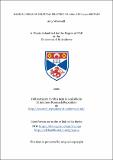Radical ideas of political practice in 1780s and 1790s Britain
Abstract
This thesis examines ideas about political tactics in 1780s and 1790s Britain. Edmund Burke
characterised radicals in the aftermath of the French Revolution as speculative thinkers with no
understanding of political action. This rhetorical strategy obscured the ideas of reformers who
were frustrated with the rationalist bent of their movement and who, inspired by Scottish
philosophy and events in Ireland, tried to work out what was to be done.
James Mackintosh and Samuel Parr responded to Burke by arguing that theory could apply to
practice, while David Williams outlined how political theory could direct reformers to the means to
harness the general will and enact it through the sovereign. Interest in arming the people led
David Steuart Erskine, Robert Watson, and John Cartwright to invoke the ideas of Andrew
Fletcher. This interest in a militia was not purely theoretical; in Ireland from 1778 the Volunteers
used a combination of arms and sumptuary rules to win legislative and trading rights. Francis
Dobbs, Joseph Pollock and Henry Flood examined this movement to learn about political tactics.
Lord George Gordon advocated for Francis Dobbs in the House of Commons and was imprisoned
for his attempts to derail the Anglo-French Commercial Treaty, an issue that once again brought
together Irish politics and discussions of commerce and luxury. In the 1790s, United Irishmen
linked their understanding of the anti-luxury practice of the Volunteers with knowledge of the
constitution they had learned from John Millar at Glasgow University. Meanwhile, Lord Buchan
was using an unlikely tactic, the practice of history, to stir the Scots to pay attention to their
Buchananite heritage. The tactical thought of British radicals in the 1790s was rarely concerned
with discussions of the rights of man, but instead referred to ideas of arms, kings, commerce, and
history.
Type
Thesis, PhD Doctor of Philosophy
Collections
Items in the St Andrews Research Repository are protected by copyright, with all rights reserved, unless otherwise indicated.

